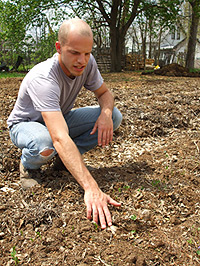An urban farm program has germinated in Indianapolis, and like gardens everywhere, it holds seeds of hope, sharing and knowledge.
The program is the brainchild of Matthew Jose, a North Central High School graduate who attended Wesleyan University in Connecticut for a year before dropping out to work on a farm in Massachusetts.
Once his hands got dirty, Jose, 24, just never stopped. He worked in community garden projects in New York City and Portland, Ore.,before returning to his Hoosier roots and a job with Purdue University’s Marion County Extension Office, where he’s been about a year.
The working farm program’s main objectives are to provide produce to area food pantries and to teach high school students about sustainable agriculture, community, philanthropy and business, Jose said.

Breaking ground — Matthew Jose examinestiny seedlings of peas growing on an urban farm at 516 N. Tacoma Ave.,a vacant lot on Indianapolis' east side. © Photo Jo Ellen Meyers Sharp
Peas, squash, tomatoes, peppers, beans and other vegetables will soon be growing on lots at 418, 424, and 516 N. Tacoma Ave., under a short-term arrangement with Riley Area Development. The goal of these mini farms is to provide produce to the First Free Methodist Church Food Pantry, 2024 E. 12th St., about a mile away.
The program has a five-year contract to farm about an acre at First Friends Meeting, 3030 Kessler Blvd. East Dr., where some perennials crops, such as asparagus, will be grown to expand seasonal offerings.Produce from this farm will be donated to area food pantries for the first and second years. By year three, it will be sold at food stands in urban neighborhoods or farmers markets, Jose said.
Two students from Arsenal Technical High School will be paid for their work on the farms. They also will be learning about the business of agriculture in a way that connects them to the earth and teaches them where food comes from and what it takes to produce it, Jose said.
The program is rich with activities that promote youth development and that educate and feed the community, said Ron Hoyt, executive director of the Marion County Extension Office.
All of the farms will be sustainable, which means concerted effort will be made to develop healthy soil with compost, manure and mulch, which will eliminate the need for synthetic fertilizers and pesticides,greatly reducing production costs.
Primary financial support has come from the Efroymson Fund and M &I Bank, and Master Gardeners donated tools. “The money is going toward paying me and the high school students,” Jose said.
Members of the Freewheelin’ Community Bike Cooperative are building a bike trailer that will allow Jose and the students to transport the freshly harvested produce to the pantry on human power rather than gasoline.
“If the program does well, I’m hoping to set up a Community Supported Agriculture (or food subscription) program using the land at First Friends,” he said. “This would provide revenue in addition to diversifying the growing and marketing experiences for the students.This sort of CSA, though, would not likely begin for another two to three years.”
If you are interested in donating time, talent or money, contact Jose at mejose@purdue.edu.